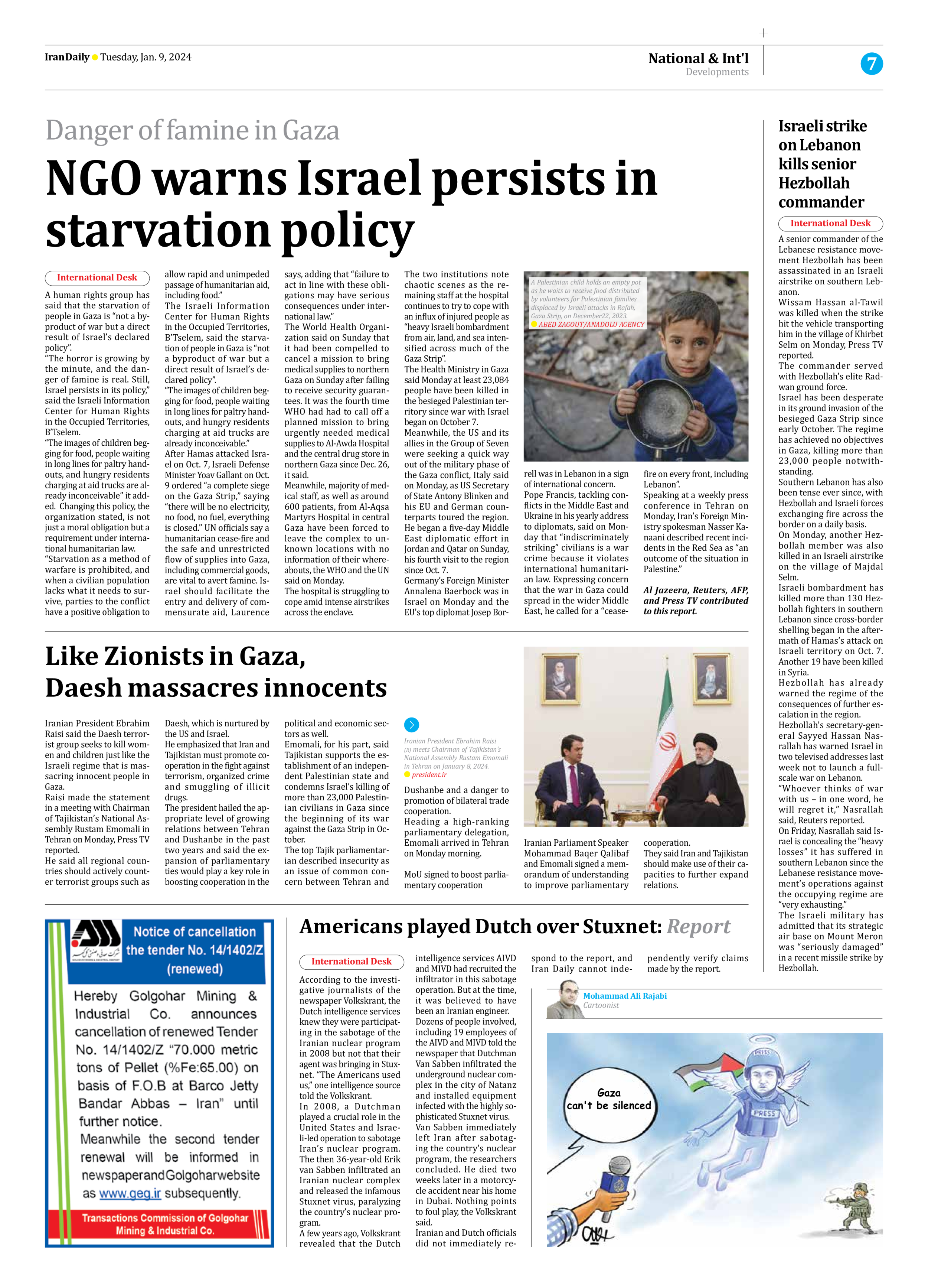
Danger of famine in Gaza
NGO warns Israel persists in starvation policy
A human rights group has said that the starvation of people in Gaza is “not a byproduct of war but a direct result of Israel’s declared policy”.
“The horror is growing by the minute, and the danger of famine is real. Still, Israel persists in its policy,” said the Israeli Information Center for Human Rights in the Occupied Territories, B’Tselem.
“The images of children begging for food, people waiting in long lines for paltry handouts, and hungry residents charging at aid trucks are already inconceivable” it added. Changing this policy, the organization stated, is not just a moral obligation but a requirement under international humanitarian law.
“Starvation as a method of warfare is prohibited, and when a civilian population lacks what it needs to survive, parties to the conflict have a positive obligation to allow rapid and unimpeded passage of humanitarian aid, including food.”
The Israeli Information Center for Human Rights in the Occupied Territories, B’Tselem, said the starvation of people in Gaza is “not a byproduct of war but a direct result of Israel’s declared policy”.
“The images of children begging for food, people waiting in long lines for paltry handouts, and hungry residents charging at aid trucks are already inconceivable.”
After Hamas attacked Israel on Oct. 7, Israeli Defense Minister Yoav Gallant on Oct. 9 ordered “a complete siege on the Gaza Strip,” saying “there will be no electricity, no food, no fuel, everything is closed.” UN officials say a humanitarian cease-fire and the safe and unrestricted flow of supplies into Gaza, including commercial goods, are vital to avert famine. Israel should facilitate the entry and delivery of commensurate aid, Laurence says, adding that “failure to act in line with these obligations may have serious consequences under international law.”
The World Health Organization said on Sunday that it had been compelled to cancel a mission to bring medical supplies to northern Gaza on Sunday after failing to receive security guarantees. It was the fourth time WHO had had to call off a planned mission to bring urgently needed medical supplies to Al-Awda Hospital and the central drug store in northern Gaza since Dec. 26, it said.
Meanwhile, majority of medical staff, as well as around 600 patients, from Al-Aqsa Martyrs Hospital in central Gaza have been forced to leave the complex to unknown locations with no information of their whereabouts, the WHO and the UN said on Monday.
The hospital is struggling to cope amid intense airstrikes across the enclave.
The two institutions note chaotic scenes as the remaining staff at the hospital continues to try to cope with an influx of injured people as “heavy Israeli bombardment from air, land, and sea intensified across much of the Gaza Strip”.
The Health Ministry in Gaza said Monday at least 23,084 people have been killed in the besieged Palestinian territory since war with Israel began on October 7.
Meanwhile, the US and its allies in the Group of Seven were seeking a quick way out of the military phase of the Gaza conflict, Italy said on Monday, as US Secretary of State Antony Blinken and his EU and German counterparts toured the region. He began a five-day Middle East diplomatic effort in Jordan and Qatar on Sunday, his fourth visit to the region since Oct. 7.
Germany’s Foreign Minister Annalena Baerbock was in Israel on Monday and the EU’s top diplomat Josep Borrell was in Lebanon in a sign of international concern.
Pope Francis, tackling conflicts in the Middle East and Ukraine in his yearly address to diplomats, said on Monday that “indiscriminately striking” civilians is a war crime because it violates international humanitarian law. Expressing concern that the war in Gaza could spread in the wider Middle East, he called for a “cease-fire on every front, including Lebanon”.
Speaking at a weekly press conference in Tehran on Monday, Iran’s Foreign Ministry spokesman Nasser Kanaani described recent incidents in the Red Sea as “an outcome of the situation in Palestine.”
Al Jazeera, Reuters, AFP, and Press TV contributed to this report.







